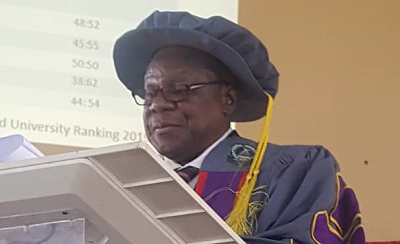
Abuja, 19 Dec. 2018, (ACBF) -- African universities have been advised to position themselves to be relevant in overcoming poverty, malnutrition, diseases, climate change and other developmental issues plaguing the continent.
The Executive Secretary of the African Capacity Building Foundation, Prof. Emmanuel Nnadozie, gave the advice yesterday while delivering the third convocation lecture at the Alex Ekwueme Federal University, Ndufu-Alike, Ikwo, in the southeastern Nigerian state of Ebonyi.
Speaking on the role of the university in fulfilling education’s promise on the continent, he said African universities should provide leadership in developing new critical technical skills for implementing Africa’s Agenda 2063 and the Sustainable Development Goals. ACBF, the African Union’s specialized agency for capacity development, estimates the skills gap needed to implement the ten-year plan of Agenda 2063 to include about 4.3 million engineers and 1.6 million agricultural scientists and researchers.
Prof. Nnadozie said a renewed agenda for African universities must focus on skilled human resources for economic growth, especially in science and technology, to be prepared for the fourth industrial revolution and the global shifts towards robotics, cloud computing and artificial intelligence.
According to him, many African universities are not educating young Africans to understand and solve Africa’s problems, adding that most of the continent’s universities are isolated from their immediate environment and from the broader requirements of the continent. The result is that “more than 100,000 foreign experts are employed to address Africa’s problems at a staggering cost of $4 billion, most of it from aid budgets,” he said.
On the decline in the standard of university education in Nigeria, he attributed the problem to among other things, woeful education policies, poor planning, inadequate funding, brain drain, frequent labor disputes, poor leadership, inadequate teaching staff and research capacity.
To revamp the institutions, Prof. Nnadozie urged Nigeria to raise the level of its spending on education to the 26 percent prescribed by UNESCO. The government, business, civil society and the academia should also collaborate to position the institutions to deliver research, better quality teaching and services to the community. He also canvassed for an enabling environment for excellence for staff through improved conditions of service, infrastructure, virtual libraries, information and communication technologies and internet connectivity.
ENDS
For more information, please contact:
The African Capacity Building Foundation
Harare, Zimbabwe
+263-242 304663, 304622, 332002, 332014; Ext. 273
Email: [email protected]
ABOUT the African Capacity Building Foundation (ACBF)
Having spearheaded and robustly coordinated capacity development programs worth over 700 million US dollars across 45 countries and 8 regional economic communities (RECs) in Africa since 1991, ACBF has gathered the requisite experience that makes it the go-to institution for expert knowledge and human resources to advise and support African countries, regional economic communities and institutions on decisive steps to take to develop the practical skills urgently required for the continent’s economic transformation.
Evidence from our cutting-edge work (constituting hundreds of knowledge publications) and the work of several partners show that Africa's development efforts are being hobbled by severe capacity deficits often in the form of shortage of critical skills, deficits in leadership, inhibiting mindsets and weak institutions. The continent’s practical skills shortage is acute in key areas such as Science, Technology, Engineering and Mathematics (STEM) and Agriculture.
At ACBF, we will continue using our unmatched track record in managing financial facilities for development, our vast knowledge gathering experience thanks to the exceptional skills mix of our core staff as well as our strong strategic partnerships and networks to help countries and institutions identify their capacity needs, advise them on how to plug these capacity weaknesses and on where to find the knowledge and resources to develop the requisite capacity resources, effectively use them and retain them to achieve their short and long-term development objectives.
ACBF’s vision is an Africa capable of achieving its own development.
Support this crucial work
Leverage your own efforts geared towards Africa’s transformation, or
Partner with us by writing to:
[email protected] (to support us with resources for Africa’s Capacity Development)





